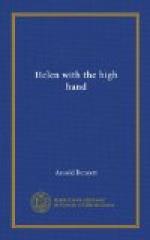Between the southernmost seat and the south bowling-green, on that Saturday afternoon, stood Mr. James Ollerenshaw. He was watching a man who earned four-and-sixpence a day by gently toying from time to time with a roller on the polished surface of the green. Mr. James Ollerenshaw’s age was sixty; but he looked as if he did not care. His appearance was shabby; but he did not seem to mind. He carried his hands in the peculiar horizontal pockets of his trousers, and stuck out his figure, in a way to indicate that he gave permission to all to think of him exactly what they pleased. Those pockets were characteristic of the whole costume; their very name is unfamiliar to the twentieth century. They divide the garment by a fissure whose sides are kept together by many buttons, and a defection on the part of even a few buttons is apt to be inconvenient. James Ollerenshaw was one of the last persons in Bursley to defy fashion in the matter of pockets. His suit was of a strange hot colour—like a brick which, having become very dirty, has been imperfectly cleaned and then powdered with sand—made in a hard, eternal, resistless cloth, after a pattern which has not survived the apprenticeship of Five Towns’ tailors in London. Scarcely anywhere save on the person of James Ollerenshaw would you see nowadays that cloth, that tint, those very short coat-tails, that curved opening of the waistcoat, or those trouser-pockets. The paper turned-down collar, and the black necktie (of which only one square inch was ever visible), and the paper cuffs, which finished the tailor-made portion of Mr. Ollerenshaw, still linger in sporadic profusion. His low, flat-topped hat was faintly green, as though a delicate fungoid growth were just budding on its black. His small feet were cloistered in small, thick boots of glittering brilliance. The colour of his face matched that of his suit. He had no moustache and no whiskers, but a small, stiff grey beard was rooted somewhere under his chin. He had kept a good deal of his hair. He was an undersized man, with short arms and legs, and all his features—mouth, nose, ears, blue eyes—were small and sharp; his head, as an entirety, was small. His thin mouth was always tightly shut, except when he spoke. The general expression of his face was one of suppressed, sarcastic amusement.
He was always referred to as Jimmy Ollerenshaw, and he may strike you as what is known as a “character,” an oddity. His sudden appearance at a Royal Levee would assuredly have excited remark, and even in Bursley he diverged from the ordinary; nevertheless, I must expressly warn you against imagining Mr. Ollerenshaw as an oddity. It is the most difficult thing in the world for a man named James not to be referred to as Jimmy. The temptation to the public is almost irresistible. Let him have but a wart on his nose, and they will regard it as sufficient excuse for yielding. I do not think that Mr. Ollerenshaw was consciously set down as an oddity




